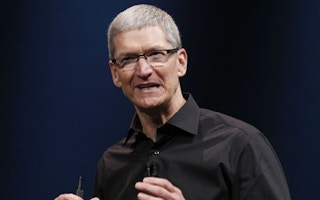Apple CEO Tim Cook recently won well-deserved praise for telling shareholders challenging the company’s efforts on climate change that they should sell the stock if they don’t like Apple’s approach. Cook asserted the common-sense position that ignoring climate change was far riskier than the multiple steps the company is taking to address it.
Cook’s response was direct and strong: “If you want me to do things only for ROI reasons, you should get out of this stock.”
The Twittersphere has erupted in applause as the head of what is arguably the biggest brand in the world rejects short-term thinking.
Cook deserves great credit for his statement, which demonstrates leadership and vision. But the public’s response also reveals how low the bar is for forward-looking statements on the tyranny of shareholder value. The fact that Cook’s statement stands out from the crowd says as much about the crowd as it does about Cook.
Short-term thinking continues to dominate the exchanges between investors and business leaders. There are exceptions, of course: Unilever’s Paul Polman has been a clear and consistent voice exposing the flawed thinking inherent in those advancing the common (and narrow) definition of shareholder value. Indra Nooyi of PepsiCo has taken the long view of the product mix for her company, and Starbucks’ Howard Schultz has made the case for business statesmanship.
But all too often, false choices are allowed to dominate. Indeed, one of the central elements of this story, covered well by Joel Makower of GreenBiz, is that the National Center for Public Policy Research (NCPPR) has brought “climate denialism” into shareholder meetings.
The NCPPR came to the Apple shareholder meeting to make the absurd argument that Apple was somehow wasting shareholders’ money on climate change efforts. That’s what promoted Cook’s indignant (and appropriate) response.
So let’s give two big cheers to Tim Cook for expressing a common sense, forward-looking view in a forceful way. The situation called for exactly that.
But let’s also call out the lies that climate deniers are now peddling—that investments in climate progress are damaging shareholder value. This shows just how degraded the debate over value has become.
And let’s hope that more executives will follow Cook’s lead and take the long view of what constitutes value for shareholders—and the rest of us.
Aron Cramer, president and CEO of the BSR San Francisco office, is recognized globally as a preeminent authority on corporate responsibility and sustainability strategy by business, NGOs, and the public sector. This post originally appeared in the BSR blog.








